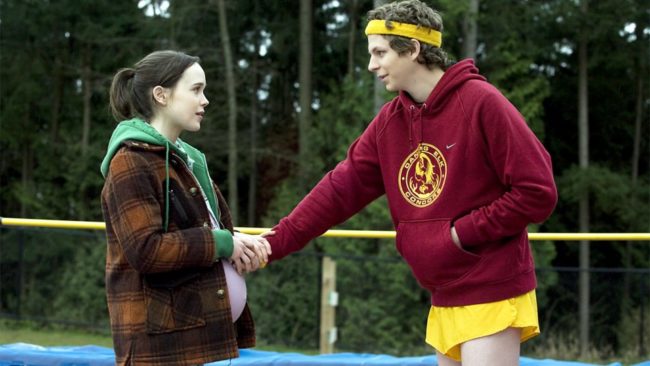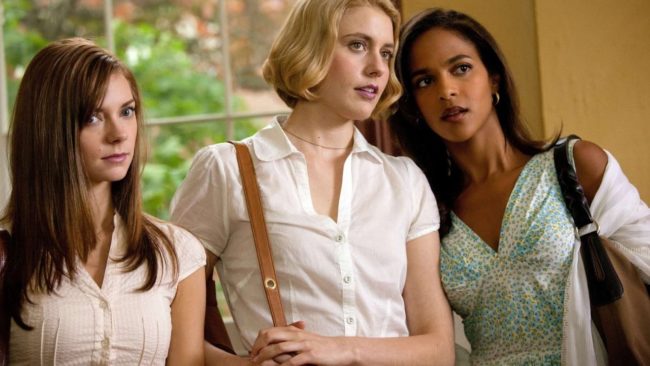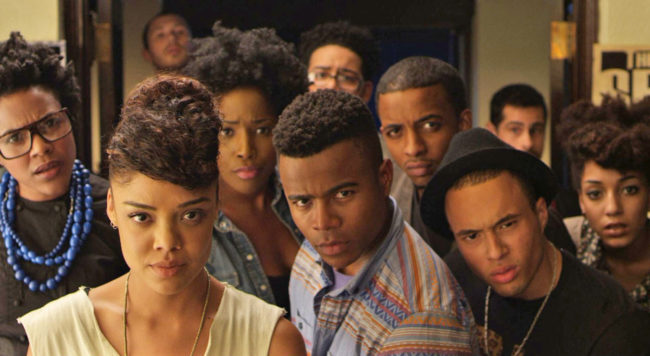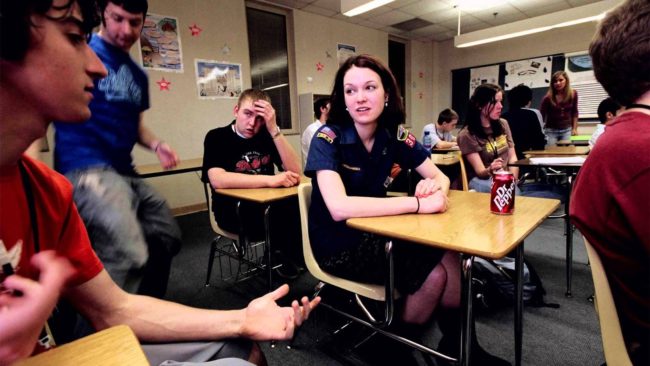WGF Summer of Screenplays: Our Five Fave School Movies
In this week's Summer of Screenplays post, Library Intern, Olive Sherman, reflects on her five favorite high school and college set films: Before there were movies for me there were Disney Channel Movies. Watching movies in my young life meant a Shrek 2 DVD or High School Musical on the TV while leaning against the costume trunk. It was really only Disney that could make the world of the teenager look magical. Where, on a school trip to Rome, the lead female protagonist finds a Roman boyfriend and sings a sparkling triumphant pop number in a convertible skirt for one hundred thousand people with a real life Italian pop star. In what was almost my earliest understanding, movies served an anticipatory if not aspirational purpose, in that the story projected on the screen often reflected a near future, a high school future, a college future, thus making it (and later movies more generally) completely fascinating.
The five selections below make up my favorite school movie scripts in the Writers Guild Foundation Library. To varying degrees of reality, comedy and drama, they describe the stories of high school and college students in ways that illuminate the components of school and what they mean to people who are growing.
Juno (2007) - Written by Diablo Cody

Juno is the first movie I ever loved, like really truly loved like I owned it. It’s not about the unplanned pregnancy, abortion, adoption or the baby... in my opinion at least. It’s about Juno MacGuff, effervescent, clever. Under her gaze, high school -- in all of its threats and its palaver -- becomes obvious, dynamic, lucid and meticulously appreciated by weird girls. Juno’s every line gleams with a youthful, terrestrial wisdom, rendering the script endlessly quotable. Particularly special is her relationship with her best friend Paulie Bleeker, which is among the most caring, earnest and most romantic relationships depicted on screen to date.
Damsels in Distress (2011) - Written by Whit Stillman

Damsels in Distress, like all of Whit Stillman’s films, is concerned first and foremost with order, and encourages a theoretical framework in which order takes precedence over contradiction and chaos. A collegiate environment is a particularly interesting setting in which to investigate such a framework seeing as both poles (dis/order) exist there simultaneously. Here, three prim pastel college girls adopt a sophomore transfer student and collectively proselytize their heathen frat boy and suicidal-depressive peers into a life that is structured and proper, meanwhile experiencing and contending with their own forms of disarray. What results is a film that probes at the question of artifice and mechanics in order. It asks if order is at all organic, and if there is a way for us humans to follow it naturally?
American Graffiti (1973) - Written by George Lucas and Gloria Katz & Willard Huyck

From the date of its 1973 release, American Graffiti, a film set in the Summer of 1962 seems to have provoked one overwhelming declaration. “Things are different now,” a friend and I agreed last week after a screening of the movie in Santa Monica. But of course, we’re all wrong about our changing times, and the better question gets at what exactly has stayed the same? What to do with the timelessness of high school? For American Graffiti is ultimately a film about high school friendships, their tenuousness, their questionable lasting power. After graduation, is there any point to our high school friendships? If there is one thing to take away from American Graffiti’s big dance scenes in the school gym, in which Steve, Laurie and Curt drift in a sea of barely familiar 17 and 18 year-olds, it’s that we’re mostly friends with each other in high school so that we don’t have to show up to things alone. All of the relationships in the movie feel somewhat ephemeral, or at least in danger of being so, begging the question about what truly keeps us attached to people and places, more than just school and the structure of the day? What makes a relationship permanent?
Dear White People (2014) - Written by Justin Simien

For me what is most interesting about Dear White People is how it addresses issues of identity politics, political correctness, etc. by pointing to the complex existential problems that arise with Blackness in contemporary America, particularly through the lens of elite college campuses. In the film a new randomized housing policy puts a traditionally African American dorm in danger of white encroachment, prompting polarized protests across the student body lead mostly by Sam White, the newly elected Head of Armstrong-Parker house whose radio show “Dear White People” serves as narration throughout the movie.
The movie references a history of White fixation with Black culture and the White-manufactured stereotypes of Black life that lead to racist American folktales, practices such as blackface minstrelsy, and the several blackface college parties that have actually occurred on real college campuses. Such a fixation, as is illuminated in the film, is a form of cultural imperialism, dangerous in part because of the way it forces Blackness into the realm of performance. Through cultural appropriation, and similar acts of othering, white students attempt to coerce students of color into confusion about their racial identity (is it innate, entirely performative?), thereby rejecting their humanity, their need need to reckon a personal identity with that of the collective. But, as the movie shows, a culture can also empower a marginalized group to resist their oppressors, and unite in their own experience of difference.
American Teen (2008) - Written by Nanette Burstein

American Teen, a 2008 documentary, follows the lives of five high school seniors as they navigate college applications, high school romances, prom and basketball in small town Warsaw, Indiana. It initially garnered criticism for feeling sensationalized or stagey (in one poster, the five cast members pose as the Breakfast Club characters), but I’ve found that it is this exact “fake” feeling that makes the movie feel so valuable in our collective consciousness regarding high school. The movie’s real “big reveal” is that there is no mystery about high school: it’s not nice, there is a fit/no-fit mentality, information spreads, sports are important, these are all things we knew all along, but we never saw them feel so insular. American Teen reminds us that high school is basically its own little world with problems that recycle within the school, but that we are basically mostly freed from upon graduation. It’s the perfect subject for a movie, because movies do the exact same thing: they show you a new world that’s yours for a moment, then leave you with something small.
xoxo -- Olive
